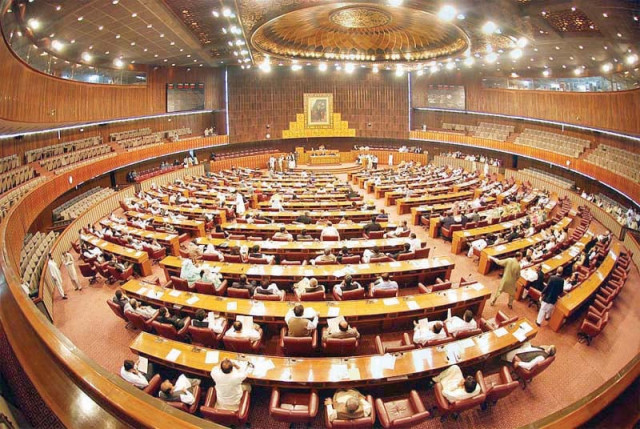Disqualification in focus as AGP argues on presidential reference
CJ says nothing about disqualification over defection is mentioned in the Election Act

Chief Justice Umar Ata Bandial (CJP) said on Friday that it could not “fill in the blanks” and asked the government why it did not enact a law to determine the length of disqualification of a lawmakers for violating Article 63-A.
Chief Justice Umar Ata Bandial is heading a five-judge larger bench to hear a presidential reference, seeking interpretation and scope of Article 63A of the Constitution.
Unlike previous hearings, few politicians witnessed the courtroom proceedings on Friday. PML-N Punjab President Rana Sanaullah was closely observing the court proceedings. It was also witnessed that judges’ opinion was still divided on the interpretation of Article 63-A of the Constitution.
“Nothing related to disqualification over defection is mentioned in the Election Act 2017,” Chief Justice Bandial said, while referring to Article 63-P of the Constitution. He also asked the attorney general for Pakistan (AGP) that the federal government had the power to make the law then why was it not done.
Chief Justice Bandial made it clear that the apex court could not go beyond the Constitution. Regarding AGP Khalid Jawed Khan’s contention for applicability of lifetime disqualification under Article 62(1)(f) of the Constitution on the defecting lawmakers, the CJP said that the 18th Amendment clarified that declaration from a court of law was required to disqualify a lawmaker for life.
Read No-trust vote: Speaker adjourns crucial NA session till Mar 28
he top judge of the county then asked the AGP whether the Election Commission of Pakistan (ECP) was a court of law. However, Justice Ijazul Ahsan responded that whenever the apex court upholds any lower court’s decision, then it comes under the purview of the court declaration.
The chief justice said that breach of trust was a serious offence, but asked the AGP to justify how a lawmaker betraying political party could be disqualified for life. Justice Ahsan asked him whether the party got such a declaration of loyalty before issuing ticket to its candidates.
The judge also noted that a person contesting elections on a party platform did get votes on the basis of party’s election symbol. It was compulsory for a lawmaker to follow the party’s directions as they were elected on the party ticket.
Justice Mandokhel asked whether party members were bound to follow the party head in case of violation of the Constitution. The AGP said that if lawmakers had serious grievances then he should resign rather that giving vote on no-confidence motion against his own people.
Chief Justice Bandial said that there was no mechanism within the parties where lawmakers could raise their concerns on any issue.
Justice Mandokhel asked whether the president invited all political parties to resolve their concerns before approaching the top court regarding interpretation of the Article 63-A. He further asked was it not appropriate to consult political parties before approaching the court.
However, the AGP said that the incumbent president was not acting like former president Ghulam Ishaq, who dissolved the assemblies in such situations. Justice Mazhar Alam Miankhel quipped that the government had approached the court even before any defections.
Justice Miankhel asked how could the court announce punishment before a crime. “The government brought forth the reference to seek clarity on the law,” the AGP responded. Chief Justice Bandial asked the AGP to tell the court when a lawmaker would be disqualified for life.
AGP Khan replied that he would provide a “direct relation” between articles 62 and 63. Justice Ahsan said no article of the Constitution could be read alone and further stated that articles 62 and 63 were to be read together.
AGP Khan said there should be a clear punishment if there was a crime. Justice Ahsan responded that the court’s job was to interpret the Constitution. AGP Khan added that on the Hasba bill, the government had come to the court against its draft.
Justice Mandokhel asked why the president was seeking opinion of the top court. “Does he have some material, which made him to approach the court,” he asked. AGP Khan said the top court was bound to give opinion on a presidential reference.
Justice Ahsan said the Supreme Court had to decide on the consequences of defection under Article 63-A. The AGP said that Article 62(1)(f) had blank spaces and it was still interpreted by the court. Even parliament did not insert lifetime disqualification for violation of Article 62(1)(f).
The court adjourned the case till Monday. The AGP stated that he would require two more hours to complete his arguments on Monday.



















COMMENTS
Comments are moderated and generally will be posted if they are on-topic and not abusive.
For more information, please see our Comments FAQ